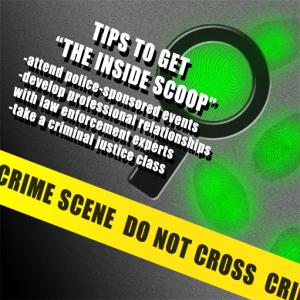My guest today is Whitney Jones. Whitney, welcome to The Writer’s Forensics Blog.

The writer is a person who seeks knowledge. He or she is very comfortable researching in the library or searching through websites for the information they need in order to write a brilliant piece. However, sometimes the information that is stored in these tomes and files can be outdated. Processes change frequently, and especially those in forensic science.
Because of this, it’s almost necessary for writers to create contacts with individuals who spend their lives in fields relating to the writer’s interests. This isn’t always easy, but there are a few ways to create contacts in any field. If you’re trying to get the latest information on forensics, try some of these approaches.
First of all, consider who you already know. Maybe your second-cousin Vinnie just joined the police force as a traffic cop. Don’t be afraid to ask him for an introduction to someone who deals more with forensics. If it’s a smaller town where there’s less for police force to do, they’re more likely to respond positively. On the other side of the coin, large towns are more likely to have the kind of crime and medical issues you’ll be focusing on in your novel.
If you don’t already have contacts, try going to venues where the experts are likely to be at. For example, forensic scientists will usually have a booth up at police-sponsored charity events or fairs. Usually each department will have their own booth up with pamphlets and other goodies for kids. There’s usually a representative at each table who’s there to answer questions.
At this point the writer will just want to make first contact. There is no need to tell the expert that you’re a writer unless they ask about it. It will undoubtedly take quite a time investment before the expert will become a contact this way, but if you continue to come to the events and strike up a friendly conversation, you should be able to create a connection. Just remember to keep it professional, and never act like a groupie.
Another way for writers to gain contacts in the forensic field would be to take some classes. As writers are pursuers of knowledge, they would benefit greatly from taking some criminal justice classes. Your professor will likely have studied the justice system and crime for decades and are much more likely to sit down for a chat with a student than with a person who got their name from a college website. Consider the class an investment in both knowledge and contacts.
If there isn’t enough time to cultivate a contact or take a class, Google will be your best friend—to a degree. It will help you connect to experts’ blogs and find places like this blog that have up-to-date forensics information. If there’s ever a question of a blog’s veracity, don’t be afraid to try to contact the author and ask about sources.
Whitney Jones loves Diet Dr. Pepper and solving crime novels. She’s considering taking classes towards a criminal justice degree at Colorado Tech in the fall. Check out Whitney’s writings at The Professional Intern.
